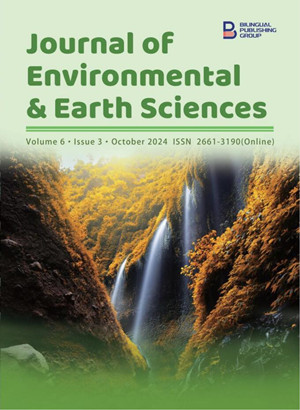
An Asteroid Impact Event Forming the Intercontinental Geomorphology from East Asia to North Africa, and More
DOI:
https://doi.org/10.30564/jees.v6i3.6899Abstract
From the perspective of the thin shell droplet dynamics and based on the geographical and morphological data of the vast area from east to west Asia, this study suggests a tangential impact event of a quartzite asteroid with 430km diameter which may explain the formation of all basins, plateaus, mountains, Gobi and deserts northeast from the Outer Mongolia East Gobi Province and southwest to the Sahara Desert and connect the series of the huge geomorphic formation event with a homologous and sequential formation process. On this basis, a "continent formation theory" is proposed that continent and mountain are formed from the cooling of lava surge flow, and the new continental movement and structure was thus explained as well.
Keywords:
Asteroid impact event; Tarim Basin; Tibetan Plateau; Iranian Plateau; Continental Formation HypothesisReferences
[1] Rothery, D.A., Gilmour, I., Sephton, M.A., (Eds.), 2018. An Introduction to Astrobiology. DOI: https://doi.org/10.1017/9781108355162
[2] Ren,J., Niu, B., Xu, Q., et al., 2022. Multisphere tectonic view of the Earth system. Acta Geological Sinica. 9601, 50--64.
[3] NASA. Earth systems science: a close review. Report of the Earth System Science Committee of the NASA Advisory Council.
[4] Elbeshausen, D., Wünnemann, K., Collins, G.S., 2013. The transition from circular to elliptical impact craters. Journal of Geophysical Research: Planets. 118(11), 2295–2309. Portico. DOI: https://doi.org/10.1002/2013je004477
[5] Hou, Z., Yang, W., 2011. Multi-scale inversion of density structure from gravity anomalies in Tarim Basin. Science China Earth Sciences. 4101, 29--39.
[6] Jing, X., Cheng, S., Wang, X., et al., 2009. Satellite gravity anomaly characteristics of western China. Xinjiang Petroleum Geology. 3001, 61--64.
[7] Xu, W., Sun, Z., Li, H., et al, 2013. New Permian paleomagnetic data from Gudong Mountain area in the Tarim Block and their tectonic implications. Geological Bulletin of China. 3210, 1566--1574.
[8] Fang, D., Wang, P., Shen, Z., et al., 1998. Cenozoic paleomagnetic results and phanerozoic apparent polar wandering path of Tarim Block*. Science in China Series D: Earth Sciences. 41(S2), 105–112. DOI: https://doi.org/10.1007/bf02984518
[9] Li, Y., Sharps, R., McWilliams, M., et al., 1989. Paleomagnetic Results of the Permian in the Tarim Block and Reconstruction of the Permian Continental China. Xinjiang Geology. (02), 22--33. DOI: https://doi.org/10.1007/BF02984518
[10] USGS. Earthquake Hazards Program. Geologic Province and Thermo-Tectonic Age Maps.
Downloads
How to Cite
Issue
Article Type
License
Copyright © 2024 Yanju Wei, Yajing Yang, He Liu

This is an open access article under the Creative Commons Attribution-NonCommercial 4.0 International (CC BY-NC 4.0) License.







 Yanju Wei
Yanju Wei






